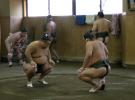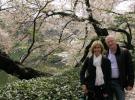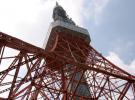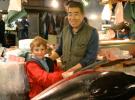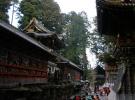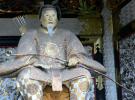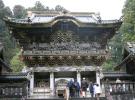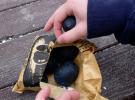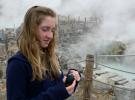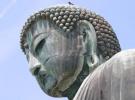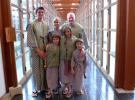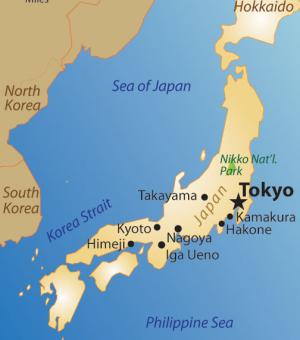Destinations > Asia > Japan > Japan
Destination:
Japan
- Overview
- Basics
- Getting Ready
- Accommodations
- Restaurants
- Trip Highlights
- Itinerary
- Explore by Area - Tokyo
- Explore by Area - Kyoto
- Trip Extensions
- Tokyo Monthly Calendar
- Contacts
Tokyo Monthly Calendar
topJanuary 2013
1 January—New Year's Day
Public holiday. Shinto talismans adorn the entranceways of homes, symbolizing prosperity, purity, longevity and protection from evil spirits. Special foods—broth, herring roe, black beans, dried chestnuts and seaweed—are served. Because factories are closed this day and smoke and fumes reduced, you may get a view of Mount Fuji from Tokyo. Throughout the week, families visit shrines and temples. Everyone strives to pay debts incurred from the previous year.
1-2 January - Bank Holiday
2 January—Kokyo Ippan Sanga
The Imperial Palace opens its grounds to the public for one of only two open houses during the year (the other is 23 December, the emperor's birthday). The royal family makes an appearance before great crowds. 1 Chiyoda-ku. For information, call 3212-2111.
6 January—Dezomeshiki Parade
Firemen perform acrobatic tricks atop tall bamboo ladders. The parade route along Harumi Cho-dori (Ginza Station on the Hibiya, Ginza or Marunouchi lines). For information, call 3212-2111.
14 January—Coming-of-Age Day
Public Holiday. Young people who have turned 20 during the preceding year are honored.
Early January—New Year Holiday Season
Government offices and some businesses close during this time. Some companies close as early as December 23 and do not re-open until the second week of January.
Late January—Plum Blossom Festivals (Ume Matsuri)
These red and white flowers are the first heralds of spring and are believed to offer magical protection against evil and various diseases. The plum-blossom festivals reach their peak mid-February to mid-March at parks, gardens and shrines throughout the Tokyo area. For more information, call 5321-3307.
Throughout January—New National Theatre
The New National Theatre is home to many opera, ballet, contemporary-dance and teater performances. 1-1-1 Honcho, Shibuya-ku (Hatsudai Station on the Keio/Shinjuki line). For information, call 5351-3011. For tickets, call 5352-9999. Continues through early July 2011.
topFebruary 2013
11 February -National Foundation Day
Public holiday.
Early February—Setsubun
According to the lunar calendar, this day marks the end of winter. Temples and shrines throughout Tokyo hold bean-throwing contests to scare away the devils and bad luck. http://www.jnto.go.jp.
Early-Mid February—Plum Blossom Festivals
These red and white flowers are the first heralds of spring and are believed to offer magical protection against evil and various diseases. The plum-blossom festivals reach their peak mid-February to mid-March at parks, gardens and shrines throughout the Tokyo area. For more information, call 5321-3307. Continues through mid March.
Throughout February—New National Theatre
The New National Theatre is home to many opera, ballet, contemporary-dance and teater performances. 1-1-1 Honcho, Shibuya-ku (Hatsudai Station on the Keio/Shinjuki line). For information, call 5351-3011. For tickets, call 5352-9999. http://www.nntt.jac.go.jp. Continues through late June.
topMarch 2013
3 March—Hina Matsuri or Girls Day
During the Doll Festival, traditional Japanese hina dolls and miniature household articles are typically displayed in homes with young girls and at other locations throughout the city. The dolls represent the emperor, empress and other members of the court dressed in ancient costume.
20 March—Vernal Equinox
Public Holiday.
Early-Mid March—Plum Blossom Festivals (Ume Matsuri)
These red and white flowers are the first heralds of spring and are believed to offer magical protection against evil and various diseases. The plum-blossom festivals reach their peak mid-February to mid-March at parks, gardens and shrines throughout the Tokyo area. For more information, call 5321-3307.
Late Mar—Tokyo International Anime Fair
This annual event draws approximately 15,000 industry members and 50,000 fans. Weekend events for the public include a competitive film festival, character shows, live performances, voice-over lessons and exhibits from nearly 150 businesses. Tokyo Big Sight, 3-21-1 Ariake, Koto-ku. For information, call 5530-1111. For tickets, call Ticket Pia at 983-222.
Late March—Japan Fashion Week in Tokyo
The 10th annual Japan Fashion Week showcases Japan's newest fashions. Various venues. Showcase of Japan's newest fashions. Various venues.
Throughout March—New National Theatre
The New National Theatre is home to many opera, ballet, contemporary-dance and theater performances. 1-1-1 Honcho, Shibuya-ku (Hatsudai Station on hte Keio/Shinjuki line). For information, call 5351-3011. For tickets, call 5352-9999. Continues through early July.
topApril 2013
8 April—Hana Matsuri
On the birthday of Budha, statues of the diety are shown in temples, and sweet tea (amacha) is poured over them in a gesture of devotion. Children place flowers next to statues of the infant Budha.
29 April-5 May—Golden Week
This week of continuous national holidays includes Greenery Day (29 April), Constitution Day (3 May), Nation's Holiday (4 May) and Children's Day (5 May). This is one of Japan's busiest holiday seasons, and many government offices and businesses are closed. Continues through 5 May.
Mid-Late April—Cherry Blossom Viewing
The cherry trees in parks and shrines around the city usually reach full bloom during late March and the first two weeks in April. The best viewing spots are the Imperial Palace, which opens its front road for bicycling on Sunday (phone 3211-5020) and Ueno Park in Taito-ku (Ueno Station, phone 3264-2111) offers viewing by boat. Sumida Park in Asakusa (Asakusa Station, phone 5608-1111) is almost as famous as Ueno Park. For more information about projected times and sites, call 5231-3307.
Throughout April—New National Theatre
The New National Theatre is home to many opera, ballet, contemporary-dance and theater performances. 1-1-1 Honcho, Shibuya-ku (Hatsudai Station on hte Keio/Shinjuki line). For information, call 5351-3011. For tickets, call 5352-9999. Continues through early July.
Throughout April—Baseball
Three professional baseball teams play in Tokyo. The popular Yomiri Giants and the Nippon Ham Fighters share the Tokyo Dome. The Yakult Swallows play at Meiji Jingu Stadium. Advance tickets are sold by many hotels' front desks or concierge and travel agents. You can also buy tickets from one of the many ticket agencies downtown. Continues through late November.
topMay 2013
1-5 May—Golden Week
This week of continuous national holidays includes Greenery Day (April 29), Constitution Day (May 3), Nations Holiday (May 4) and Children's Day (May 5). This is one of Japan's busiest holiday seasons, and many government offices and businesses are closed.
19-20 May—Sanja Matsuri Festival
This three-day celebration at Asakusa Shrine is filled with excitment as portable shrines in lacquer and gold are hoisted and carried around the Asakusa district by happi-coated men and women. More than 2 million people attend the street parade. 2-3-1 Asakusa, Taito-ku. For information and tickets, call 3844-1575.
Throughout May—New National Theatre
The New National Theatre is home to many opera, ballet, contemporary-dance and theater performances. 1-1-1 Honcho, Shibuya-ku (Hatsudai Station on hte Keio/Shinjuki line). For information, call 5351-3011. For tickets, call 5352-9999. Continues through early July.
Throughout May—Baseball
Three professional baseball teams play in Tokyo. The popular Yomiri Giants and the Nippon Ham Fighters share the Tokyo Dome. The Yakult Swallows play at Meiji Jingu Stadium. Advance tickets are sold by many hotels' front desks or concierge and travel agents. You can also buy tickets from one of the many ticket agencies downtown. Continues through late November.
topJune 2013
Early-Late June—Iris Blooming
Though not as famous or as widely celebrated as the cherry blossoms, the irises in parks and gardens throughout the city should not be missed. A highlight is the 820-ft/520-m trail framed by approximately 1,500 Edo irises that reach their peak bloom in mi-June at Yoyogi Park, 1-1 Yoyogi-kamizonocho, Shibuya-ku (JR Harajuku Station). For information, call 3379-5511. Continues through mid-July.
10-16 June—Sanno Festival
One of the largest festivals in Tokyo. Shrines are paraded through the streets of the Akasaka district, near the Hie Jinja Shrine, 2-10-5 Nagatacho, Chiyoda-ku. For information, call 3581-2471.
Throughout June—New National Theatre
The New National Theatre is home to many opera, ballet, contemporary-dance and theater performances. 1-1-1 Honcho, Shibuya-ku (Hatsudai Station on hte Keio/Shinjuki line). For information, call 5351-3011. For tickets, call 5352-9999. Continues through early July.
Throughout June—Baseball
Three professional baseball teams play in Tokyo. The popular Yomiri Giants and the Nippon Ham Fighters share the Tokyo Dome. The Yakult Swallows play at Meiji Jingu Stadium. Advance tickets are sold by many hotels' front desks or concierge and travel agents. You can also buy tickets from one of the many ticket agencies downtown. Continues through late November.
topJuly 2013
7 July—Tanabata Matsuri
This star festival features parades of floats, shrines and folk dancers throughout the city. Other events are also scheduled.
13-15 July—Lantern Festival
The Bon or Lantern Festivals are important time for Japanese Buddhists, when the spirits of one's ancestors return to visit. Fires are lit in homes to guide the spirits and the smell of incense fills the air.
16 July—Maratime Day
Public Holiday.
28 July—Fireworks
Tokyo's grandest fireworks display of the year is launched on the last Saturday in July over the Sumida River in Asakusa. The best places to watch are between the Kototol and Shirahige bridges or at the Komagata Bridge. For information, call 5388-3141 or 5608-1111.
28 Jul—Sumidagawa Hanabi Taikai
Thousands of rockets spouting skywards along the Sumida River. The show includes a competition between rival firework companies, so expect state-of-the-art pyrotechnics. Street stalls keep crowds fueled with hot sake and corn-on-the-cob.
Early July—International Tokyo Toy Show
Hosted by the Japan Toy Association, this exhibition showcases more than 36,000 toys and gadgets. Also performances by popular children's characters.
Early July—New National Theatre
The New National Theatre is home to many opera, ballet, contemporary-dance and theater performances. 1-1-1 Honcho, Shibuya-ku (Hatsudai Station on hte Keio/Shinjuki line). For information, call 5351-3011. For tickets, call 5352-9999.
Mid-Late July—Obon
Most people take a week off during this time to visit their hometowns and pay homage to ancestors or to vacation overseas. Many shops in Tokyo are closed. This holiday is based on the lunar calendar, so its date varies between mid-July and mid-August. Bon-dance festivals continues throughout the month long period. Concludes mid August.
Throughout July—Baseball
Three professional baseball teams play in Tokyo. The popular Yomiri Giants and the Nippon Ham Fighters share the Tokyo Dome. The Yakult Swallows play at Meiji Jingu Stadium. Advance tickets are sold by many hotels' front desks or concierge and travel agents. You can also buy tickets from one of the many ticket agencies downtown. Continues through late November.
Through Mid July—Iris Blooming
Though not as famous or as widely celebrated as the cherry blossoms, the irises in parks and gardens throughout the city should not be missed. A highlight is the 820-ft/520-m trail framed by approximately 1,500 Edo irises that reach their peak bloom in mi-June at Yoyogi Park, 1-1 Yoyogi-kamizonocho, Shibuya-ku (JR Harajuku Station). For information, call 3379-5511.
topAugust 2013
Mid-Late August—Obon
Most people take a week off during this time to visit their hometowns and pay homage to ancestors or to vacation overseas. Many shops in Tokyo are closed. This holiday is based on the lunar calendar, so its date varies between mid-July and mid-August. Bon-dance festivals continues throughout the month long period.
Throughout August—Baseball
Three professional baseball teams play in Tokyo. The popular Yomiri Giants and the Nippon Ham Fighters share the Tokyo Dome. The Yakult Swallows play at Meiji Jingu Stadium. Advance tickets are sold by many hotels' front desks or concierge and travel agents. You can also buy tickets from one of the many ticket agencies downtown. Continues through late November.
topSeptember 2013
17 September—Respect for the Aged Day
Public Holiday.
24 September—Autumnal Equinox Day
Public Holiday.
Throughout September—Baseball
Three professional baseball teams play in Tokyo. The popular Yomiri Giants and the Nippon Ham Fighters share the Tokyo Dome. The Yakult Swallows play at Meiji Jingu Stadium. Advance tickets are sold by many hotels' front desks or concierge and travel agents. You can also buy tickets from one of the many ticket agencies downtown. Continues through late November.
topOctober 2013
8 October—Health and Sports Day
Public Holiday.
Late Oct—Tokyo International Film Festival
The largest film festival in Asia markets itself as one of the top 12 major festivals in the world. Features competitive screenings of international and Asian features, along with works by new directors, world cinema and classic Japanese films. Also star appearances, industry forums, symposia, exhibits and other events. Bunkamura and other cinemas in the Shibuya district. For information, call 3524-1081.
Mid October—Oeshiki Festival
A Buddhist festival observed by a procession toward the Honmonji Temple. Participants carry large lanterns decorated with paper flowers. 1-1-1 Ikegami, Otoku (Ikegami station on the Tokyu Ikegami line). For information, call 3313-6241.
Throughout October—Baseball
Three professional baseball teams play in Tokyo. The popular Yomiri Giants and the Nippon Ham Fighters share the Tokyo Dome. The Yakult Swallows play at Meiji Jingu Stadium. Advance tickets are sold by many hotels' front desks or concierge and travel agents. You can also buy tickets from one of the many ticket agencies downtown. Continues through late November.
Throughout October—New National Theatre
The New National Theatre is home to many opera, ballet, contemporary-dance and teater performances. 1-1-1 Honcho, Shibuya-ku (Hatsudai Station on the Keio/Shinjuki line). For information, call 5351-3011. For tickets, cal 5352-9999. Continues through early July 2011.
topNovember 2013
3 November—Culture Day
Public Holiday.
15 November—Schi-go-san
During the Children's Festival, children ages 3, 5 and 7 are dressed in traditional kimonos and taken to shrines by their parents so that prayers may be said for good health and future blessings.
23 November—Labor Appreciation Day
Public Holiday.
Throughout November—Baseball
Three professional baseball teams play in Tokyo. The popular Yomiri Giants and the Nippon Ham Fighters share the Tokyo Dome. The Yakult Swallows play at Meiji Jingu Stadium. Advance tickets are sold by many hotels' front desks or concierge and travel agents. You can also buy tickets from one of the many ticket agencies downtown. Continues through late November.
Throughout November—New National Theatre
The New National Theatre is home to many opera, ballet, contemporary-dance and teater performances. 1-1-1 Honcho, Shibuya-ku (Hatsudai Station on the Keio/Shinjuki line). For information, call 5351-3011. For tickets, cal 5352-9999. Continues through early July 2011.
topDecember 2013
14 December—Gishi-sai
To commemorate a famous 1702 samurai vendetta, businessmen costumed as warriors proceed along Sotobori Street to Sengakuji Temple, where the samuri are buried. A memorial service also takes place at Honjo Matsuzaka-cho Park, which was owned by the avenged samurai master. Sengakuji Temple 3-13-9 Ryogoku, Sumida-ku (Ryogoku station on the JR Sobu Line). For information, call Sengakuji Temple at 3441-5560 or Honjo Matsuzaka-cho Park at 5609-1111.
23 December—Emperor's Birthday
Public Holiday.
25 December—Christmas Day
Though not a public or official religious holiday, Christmas is widely observed in Japan.
31 Dec—Tokyo Millenario
This New Year's festival features a dazzling light sculpture and gallery. Tokyo International Forum, near Tokyo Station. For information, call 5447-0954.
Throughout December—New National Theatre
The New National Theatre is home to many opera, ballet, contemporary-dance and teater performances. 1-1-1 Honcho, Shibuya-ku (Hatsudai Station on the Keio/Shinjuki line). For information, call 5351-3011. For tickets, cal 5352-9999. Continues through early July 2011.
Mid December—Hagoita-ichi at Asakusa Kannon Temple
This ornament fair takes place in the compound of the temple. In the evening, look for the brightly colored paddles used in the ancient shuttlecock game of hanetsuki; they are specially beautiful when lanterns illuminate them. 2-31-8 Asakusa, Taito-ku (Asakusa station). For information, call 3842-0181
Late December—New Year Holiday Season
Government offices and some businesses close during this time. Some companies close as early as December 23 and do not re-open until the second week of January.
Copyright 2013 MyLittleSwans, LLC. All rights reserved. My Little Swans, the logo and Share a world of experience are registered Trademarks of MyLittleSwans, LLC. Use of this site constitutes acceptance of our Terms of Use and Privacy Policy.


